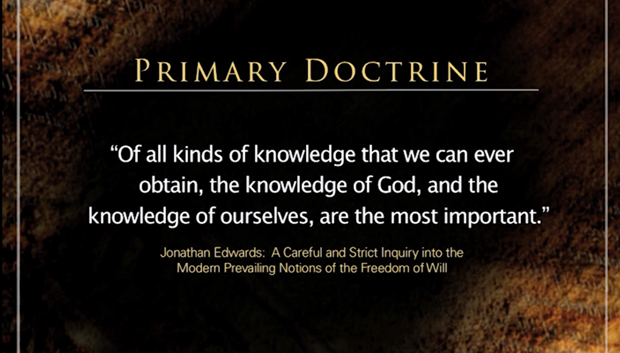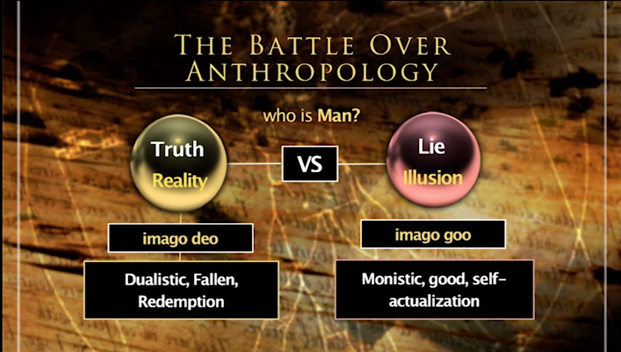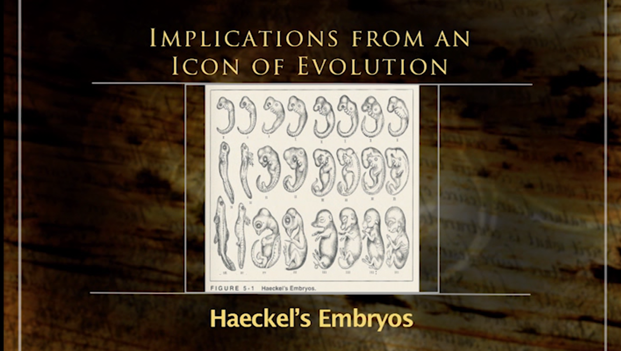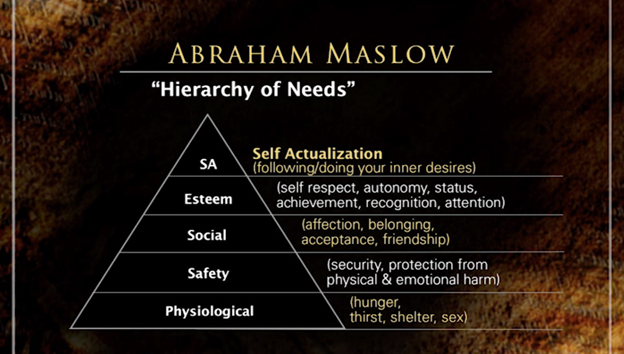This post is part 3 of a 12 part series about The Truth Project, an in-depth Christian Worldview experience led by Del Tackett and published by Focus on the Family.
Del Tackett introduces the nature of man in part 3 of The Truth Project with an interesting starting point: evil. By asking ‘what is evil’, he brings to the fore an integral theological insight about the nature of man and one of the core reasons why evil is integrated into our world. Tackett wants to stress the close connection between man and evil.
How a worldview answers who man is and then later who God is provides a good place to see where the worldview is headed. Jonathan Edwards, an early American Congregational pastor and theologian once said, “Of all kinds of knowledge that we can ever obtain, the knowledge of God and the knowledge of ourselves, are the most important.” With that in mind, Tackett aims to unveil the nature of man in this lesson. To be clear, the term “man” is used for mankind and includes all human beings, both male and female.

The Battle Over Anthropology
The two major worldviews The Truth Project has exposed has two very different opinions about mankind. As a result, the study of mankind or anthropology, is in the midst of a battle. The naturalistic worldview tends to hold a generally positive outlook on mankind, while the biblical worldview, informed by revelation, holds a more negative outlook on mankind. The Apostle Paul tells us, “But I say, walk by the Spirit, and you will not gratify the desires of the flesh. For the desires of the flesh are against the Spirit, and the desires of the Spirit are against the flesh, for these are opposed to each other, to keep you from doing the things you want to do.” (Galatians 5:16-17).

The Biblical View of Man
So there are at least two aspects of man in Paul’s understanding in this passage: the desires of the flesh and the desires of the spirit. Man includes both physical and spiritual aspects. These aspects are opposed to one another. Tackett then expands on these aspects into states or modes of man.
In Mode 1, man is innocent. God created Adam and Eve and placed them in the Garden of Eden as innocent, without blame, sin, or rebellion. (Genesis 1:27). Every other person has descended from this original couple (Acts 17:26). The innocence mode did not last long.
In Mode 2, man is fallen. After Adam and Eve fell into sin they were corrupted. Not only were they corrupted, but everyone who came after them were corrupted as well (Romans 5:12). Things got so bad, that nearly every person aimed for evil in their hearts and deeds (Genesis 6:5). Charles Spurgeon, 19th century British preacher, once wrote, “you cannot slander human nature, it is worse than words can paint it.”
Some of the biblical terms used to describe mankind in our fallen state are:
- Evil
- Dead
- Blind
- Deaf
- Lost
- Rebellious
- Without hope
- Haters of God
- Desperately wicked
- Children of the devil
Without intervention, mankind will head to eventual, eternal destruction in hell. This includes any individual who does not flee to a savior who alone can deliver them from deserved destruction.
But thankfully, there is a Mode 3. In mode 3, man is redeemed. In this state, man continues to carry the ‘image of God’ as reflecting part of the nature of God. In addition, man carries the corruption from the Fall. However, God places in redeemed men and women the Holy Spirit who instructs us in the ways of God. As a result, Scripture describes people quite differently:
- The redeemed
- Saints
- Priests
- Called out ones
- The people of God
- A holy nation
- Children of God
- Sons of God
- Beloved
- Wear white robes
- Born from above
Finally, just as there’s a destination for fallen, unredeemed people in hell, there is also a destination of the redeemed people in heaven. Theologians call it “glorification”. First John 3:2 tells us about our ultimate glorification as Christians, “Beloved, we are God’s children now, and what we will be has not yet appeared; but we know that when he appears we shall be like him, because we shall see him as he is.”
The Naturalistic View of Man: Monism
On the other hand, the naturalistic view of man is very different. In the naturalistic understanding of the world, human beings are not composed of an immaterial substance. Instead, the physical body is all that exists in people. American Philosopher Corliss Lamont said it like this: “Supernatural entities simply do not exist. This nonreality of the supernatural means, on the human level, that men do not possess supernatural and immortal souls…” In that worldview, human beings will not live forever. According to Lamont and others steeped in naturalism, when you die, you die. And that’s it.

This position makes complete sense when considering their origin story: evolution. Biological evolution teaches that human beings share a common ancestor with all lifeforms on the planet. From their perspective we’re all related and we arose from naturalistic processes apart from God. Naturalistic evolution made us.
This Godless perspective has real-world implications. For one, consistent naturalists do not see people as any more valuable than animals. Ingrid Newkirk, president for the People for the Ethical Treatment of Animals, once said, “A rat is a pig is a dog is a boy.” In Newkirk’s mind, a boy is no more valuable than a rat or pig. And why should they be? Boys came from the same stuff as pigs. Another animal rights activist, Pentti Linkola, a Finnish Green Party member, said he has more sympathy for threatened insect species than for children dying of hunger in Africa. This is a consistent view of humanity in naturalism. Boys are no more valuable than rats.
In addition, man is of one substance in atheistic naturalism. In philosophical terms it’s called “monism”. People are not composed of material and immaterial components created by God. The Humanistic Manifesto 1 said, “Holding an organic view of life, humanists find that the traditional dualism of mind and body must be rejected.”
The Moral State & Need of Mankind in Naturalism
Now that we understand the origin and essence of man according to naturalism, we should consider the moral state and need of people from that perspective. Just as in most things in worldview studies, the opposite of the biblical position will be the naturalistic position. Within the naturalistic worldview, man is not evil. Abraham Maslow, an influential psychologist in the 20th century, once wrote, “As far as I know we just don’t have any intrinsic instincts for evil.” Others have said similar things. David Noebel, from Understanding the Times quotes Carl Rogers “I do not find that…evil is inherent in human nature.” In naturalism, mankind is not evil – we are essentially good.
So if human beings are good, then what would our needs be? Abraham Maslow answered the question in his “Hierarchy of Needs”. This schema, constructed as a pyramid, puts basic needs like hunger, thirst and sex below the greater needs of safety, social, and esteem needs. The greatest need in this pyramid is self-actualization or doing our inner desire. The entire architecture of Maslow’s pyramid is a self-focused understanding of how humans are constructed and motivated.. Tackett reminds us that this is a pernicious lie that permeates throughout our culture. This lie, which could be summed up as “follow your heart”, is completely antithetical to biblical anthropology.

Instead of aiming for a naturalistic-driven self-actualization, Paul tells believers the opposite. The Apostle guides his readers away from the world and toward the creator in Colossians 3:5-10:
“Put to death therefore what is earthly in you: sexual immorality, impurity, passion, evil desire, and covetousness, which is idolatry. On account of these the wrath of God is coming. In these you too once walked, when you were living in them. But now you must put them all away: anger, wrath, malice, slander, and obscene talk from your mouth. Do not lie to one another, seeing that you have put off the old self with its practices and have put on the new self, which is being renewed in knowledge after the image of its creator. ”
Biblical Christianity stands opposed to the naturalistic push for “self-actualization”. Whereas the expression of one’s inner desires may be the goal of naturalism, the suppression of one’s inner desires is a more noble part in the ultimate goal of becoming like Jesus.
Origin of Evil in Naturalism
Moving back to the inherent problem in humanity, we revisit the concept of evil. As we look for the origin of evil, there are two major perspectives on where evil came from. In essence, naturalism acknowledges evil but places the blame on society.
Francis Schaeffer quotes Jean Jacques Rousseau in How Then Shall We Live? When Rousseau said, “If man is good by nature, as I believe to have shown him to be, it follows that he stays like that as long as nothing foreign to him corrupts him.” To Rousseau, evil didn’t start in individual people. To him, people were basically good. The problem is something “foreign.”
Carl Rogers, as quoted by Len Holdstock, tells us about the source of evil: “Experience leads me to believe that it is cultural influences which are the major factor in our evil behaviors.” So it’s not people individually who are the source of evil, rather people collectively who are the source of evil. Society is evil and that’s why people do bad things.
Since individuals are not inherently evil in naturalism, they pin evil on a different culprit. In their worldview, society is the bad guy. Society is a general description of a collection of people. Some of the actual manifestations of society are society’s structures are government, churches, family, and other social structures. Those are the real evils in society which need to be reformed or destroyed.
Why Feel Bad About Evil?
There’s another problem with the naturalistic understanding about evil. Why do we feel bad, individually, about doing evil? In other words, why do we have a conscience?
Conscience is a persistent and perplexing issue that does not have an easy explanation in an evolutionary framework. After all, the lion likely doesn’t feel bad about pouncing on a zebra for lunch. In the same way, why should humans feel guilty about cannibalism in a naturalistic universe? And yet, most people would feel guilty about cannibalism. But that does not make sense in a naturalistic universe. Naturalism cannot justify our sense of accountability for wrongdoing. Conscience does not make sense within the naturalistic worldview.
Application: A Culture in Decline
False ideas permeate our culture and false ideas about ourselves is no exception. But we can be aware of these false ideas about mankind. God tells us through Paul, “See to it that no one takes you captive by philosophy and empty deceit, according to human tradition, according to the elemental spirits of the world, and not according to Christ.” (Colossians 2:8)
In sum, the idea of “follow your heart” is a pernicious lie that has overtaken our culture. One of the reasons that lie has taken hold is philosophical naturalism and a generally positive view of human nature. As our culture has replaced a more biblical approach to humanity with a naturalistic understanding of evil and humanity, things have not gone well. Many of the problems in society can be traced back to this lie.
Image credit: Unsplash



